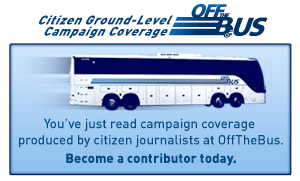
On Saturday the largest Asian-American political action committee, the 80-20 Initiative, formally endorsed Sen. Obama for president. They decided on the endorsement after a day-long convention and discussion among 33 delegates of various ethnicities, ages and party affiliations. The delegates represent a national, nonpartisan organization of 700,000 supporters.
80-20's press release did include a caveat at the very end, to say that if Sen. McCain chose Gov. Bobby Jindal of Louisiana as his running mate, the organization would "view it very helpful in winning equal opportunity for Asian-Americans. In that event, this convention may reconvene" to reconsider its endorsement. But since vice presidential candidates are not yet known, and the 80-20 Initiative did not wish to speculate, leaders encouraged members to fully support Barack Obama, including financial donations to the campaign.
The PAC came to its decision after a three-hour discussion at the Crowne Plaza in Foster City, Calif., on the San Francisco peninsula. The debates centered on how effectively Sens. Obama and McCain would address issues of the Pan-Asian American community. The group specifically focused on equal opportunity in the workplace through the enforcement of Executive Order 11246 of 1965, which outlined laws for equal employment opportunity.
80-20 had sent out questionnaires early in the primary season to all presidential candidates, asking for their written commitment to equal employment opportunities, and to give Asian-American legal professionals equal opportunities to be judges at all levels of the Federal Courts. All the Democratic candidates responded to the questionnaire, but McCain never did.
"I'm very disappointed that John McCain did not respond to our questionnaire," said Victor Lee, a Republican delegate to the endorsement convention. "He didn't say no, but he didn't say anything." Lee said that as a Republican, it was hard to argue for a McCain endorsement at the convention, when McCain simply ignored the group's questionnaire. The questionnaire consisted of six questions, and can be found here.
The 80-20 Initiative is a national, nonpartisan group dedicated to the issues of Asian Pacific Americans. Saturday's convention followed group bylaws, under which one-third of the delegates must be Democrats, one-third Republicans and one-third Independents. According to the rules, the group may endorse one, both or none of the major party candidates for president.
The group formed six years ago with the intent of creating a swing voting bloc among Asian Americans. Putting aside political differences to look at this ethnic community's interests as a whole, the goal was for 80 percent of the community to vote for the candidate that the organization would endorse.
On Super Tuesday, the Asian American vote produced a 71-to-25 percent victory for Hillary Clinton in California, where Asian Americans make up more than 12 percent of the population. The 80-20 Initiative had endorsed Clinton before the primary, purely due to the candidates' timing. Clinton had responded to their questionnaire in December, while Obama did not respond until four days before Super Tuesday.
The Obama campaign sent surrogate Ted Lieu, a California assemblyman, to speak at the convention. The campaign also sent a video message from Obama's sister, who is half-Asian. The McCain campaign sent no representative. At the end of the day, all the delegates unified in support, based on what they described as unequivocal commitment from the Obama campaign to better the rights of Asian Americans.
Victor Lee said he would tell Republican friends beyond the Asian community to vote for Obama, because he said he'd like to spread the word and get the candidate in office who can deliver on the promise of giving Asian Americans the opportunities they deserve.
Lee was not the only Republican delegate feeling disappointed in McCain. Charles Zhang, a Republican from Michigan, said of their endorsement, "I know we'll probably pay more taxes. But the most important thing for Asian Americans is equal opportunity and justice...I hope during the next election, the Republican will do more for the Asian American community."
The 80-20 Initiative had even lacked the necessary number of Republican delegates to their endorsement convention initially, filling the last four spots only a week before the event. While Republican delegates bemoaned their own party's candidate, Democrats at the convention were expectedly upbeat. But a unified attitude of determination and full support for Obama eclipsed the usual party tensions .
"We have to separate the emotions from the 'brain' side of it," said Arthur Cheung, an Independent from Mountain View, Calif. Cheung, among the younger delegates present, had stood up in the rounds of introductions earlier and said, "My name is Arthur Cheung. I don't have kids and I'm not married. But I think the work we did here today will affect the future -- for my kids that I will have."
When asked whether issues of the pan-Asian community would trump matters of national security, economy or environment, Cheung let his actions speak for themselves. In 2004, when 80-20 withdrew their initial endorsement of John Kerry, in effect making no endorsement at all, Cheung did not vote in that general election. "Sometimes it's what you identify with. Some people identify with age, some identify with gender -- high on my list is ethnicity."
If these delegates and the other 700,000 members of the 80-20 Initiative follow through in such a fashion, Obama could very well have gained a large percentage of Asian American Republicans in just one day.
